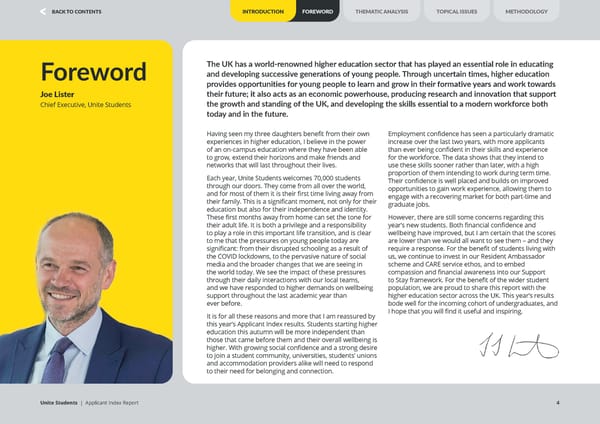Foreword The UK has a world-renowned higher education sector that has played an essential role in educating and developing successive generations of young people. Through uncertain times, higher education provides opportunities for young people to learn and grow in their formative years and work towards their future; it also acts as an economic powerhouse, producing research and innovation that support the growth and standing of the UK, and developing the skills essential to a modern workforce both today and in the future. Having seen my three daughters benefit from their own experiences in higher education, I believe in the power of an on-campus education where they have been able to grow, extend their horizons and make friends and networks that will last throughout their lives. Each year, Unite Students welcomes 70,000 students through our doors. They come from all over the world, and for most of them it is their first time living away from their family. This is a significant moment, not only for their education but also for their independence and identity. These first months away from home can set the tone for their adult life. It is both a privilege and a responsibility to play a role in this important life transition, and is clear to me that the pressures on young people today are significant: from their disrupted schooling as a result of the COVID lockdowns, to the pervasive nature of social media and the broader changes that we are seeing in the world today. We see the impact of these pressures through their daily interactions with our local teams, and we have responded to higher demands on wellbeing support throughout the last academic year than ever before. It is for all these reasons and more that I am reassured by this year’s Applicant Index results. Students starting higher education this autumn will be more independent than those that came before them and their overall wellbeing is higher. With growing social confidence and a strong desire to join a student community, universities, students’ unions and accommodation providers alike will need to respond to their need for belonging and connection. Employment confidence has seen a particularly dramatic increase over the last two years, with more applicants than ever being confident in their skills and experience for the workforce. The data shows that they intend to use these skills sooner rather than later, with a high proportion of them intending to work during term time. Their confidence is well placed and builds on improved opportunities to gain work experience, allowing them to engage with a recovering market for both part-time and graduate jobs. However, there are still some concerns regarding this year’s new students. Both financial confidence and wellbeing have improved, but I am certain that the scores are lower than we would all want to see them – and they require a response. For the benefit of students living with us, we continue to invest in our Resident Ambassador scheme and CARE service ethos, and to embed compassion and financial awareness into our Support to Stay framework. For the benefit of the wider student population, we are proud to share this report with the higher education sector across the UK. This year’s results bode well for the incoming cohort of undergraduates, and I hope that you will find it useful and inspiring. Joe Lister Chief Executive, Unite Students FOREWORD Unite Students | Applicant Index Report 4 INTRODUCTION THEMATIC ANALYSIS METHODOLOGY TOPICAL ISSUES BACK TO CONTENTS
 Unite Students Applicant Index - 2025 Page 3 Page 5
Unite Students Applicant Index - 2025 Page 3 Page 5